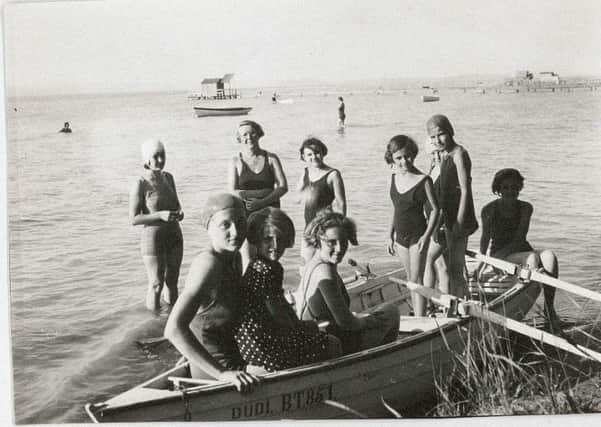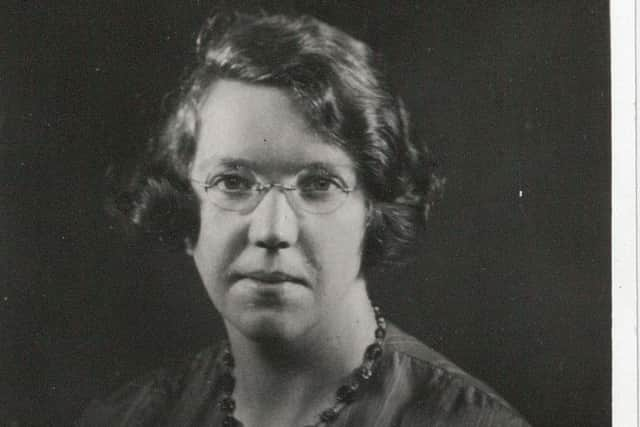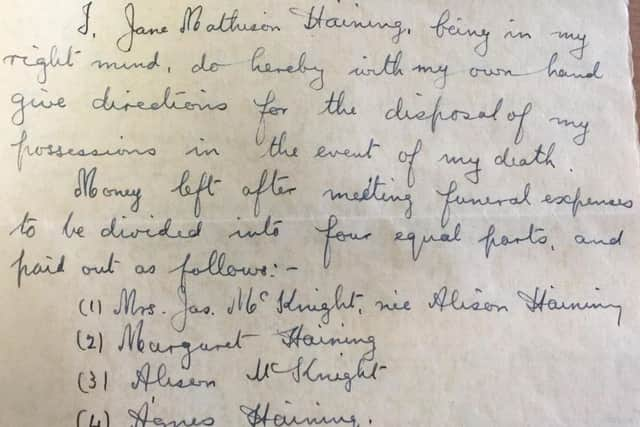Scots Auschwitz heroine Jane Haining's bravery revealed


Jane Haining, a Church of Scotland missionary who was forced into slave labour, died in Auschwitz in 1944, aged 47, after refusing to abandon the Jewish girls in her care at a home for Jewish girls run by the Scottish Mission in Budapest, Hungary.
Scots missionaries were advised to return home from Europe but Haining, a farmer’s daughter from Dunscore in Dumfriesshire, refused, and wrote: “If these children need me in days of sunshine, how much more do they need me in days of darkness.”
Advertisement
Hide AdAdvertisement
Hide AdHaining managed to keep the girls safe for four years before being betrayed.


Known as “Miss Haining” to her girls, the Scot was arrested by the Gestapo at the Mission and charged with eight offences including weeping when seeing the girls wearing yellow stars, listening to the BBC and sending British prisoners of war parcels.
The papers telling the extraordinarily moving story of prisoner 79467 were found in the World Mission Council’s archives at the Kirk’s head quarters in George Street in Edinburgh,
They also contain a translation of the last letter she wrote two days before she died and correspondence showing the efforts by Bishop Laszlo Ravasz to try to secure her release.
This year marks the 175th anniversary of the Church of Scotland Mission in Budapest, a city which had a large middle-class Jewish population in the 1930s.


Rev Ian Alexander, secretary of the Church of Scotland World Mission Council, who would like to see Haining’s story included in the school curriculum, said: “Jane Haining was a matron in the girl’s home of the Scottish Mission and her story is one of heroism and personal sacrifice.
“The most poignant discovery is her last will and testament which says ‘to be opened in the event of my death’ and dated July, 1942.
“It states, in her own handwriting, ‘I, Jane Mathieson Haining being in my right mind, do hereby with my own hand give directions for the disposal of my possessions in the event of my death’.
Advertisement
Hide AdAdvertisement
Hide Ad“She lays out what her legacies are to be and who is to receive her wireless, typewriter, fur coat and watches.


“It is a wonderful document and tremendously exciting to have something Jane Haining herself has written. It gives a sense she was fully aware of the risks she was taking.”
Mr Alexander said the story of Miss Haining – who died in the same camp as some of “her” Jewish girls – was heart breaking but also truly inspirational. He added: “Scottish missionaries were advised to return home from Europe during the dark days of the Second World War but Jane declined.”
Rev Susan Brown, minister at Dornoch Cathedral and convener of the Europe Committee of the World Mission Council, said: “In Budapest, I’ve come across the street named after her on the Pest side of the river Danube and then seen her name engraved on a memorial beside the tree of remembrance in the Synagogue. You realise the impact this ordinary but courageous young woman has made on the city.”
Miss Haining, as she was known to her girls, was born in 1897 and grew up near Dunscore in Dumfriesshire. She worked as a secretary at a threadmaker company in Paisley for 10 years before she moved to Budapest in 1932 to work as a matron in the Jewish Mission School.


Despite being under surveillance, the “house mother” managed to keep the children safe for four years until she was betrayed by the cook’s son-in-law, whom she caught eating scarce food intended for the girls.
She was arrested by two Gestapo officers at the Scottish Mission – they gave her 15 minutes to gather her belongings - and charged with eight offences.
She was accused of working amongst the Jews; weeping when seeing the girls attend class wearing the yellow stars; dismissing her housekeeper; listening to news broadcasts on the BBC; having many British visitors; being active in politics; visiting British prisoners of war and sending British prisoners of war parcels.
Advertisement
Hide AdAdvertisement
Hide AdMiss Hainin vehemently denied talking about or meddling in politics.
One of the documents discovered is an extract from a report delivered to the Reformed Church in Hungary’s Synod in 1945 – around 12 months after Miss Haining, who was forced into slave labour, had died.
Mr Alexander said: “It reveals that Bishop Laszlo Ravasz approached the Prime Minister’s office to try to have Jane freed, but it seems either he was not listened to or that the Nazis had already had her moved out of the local prison so as to prevent any local attempts to free her.
“In his address to the Synod he said ‘her superiors three times ordered her home, but she always replied that the Hungarian people were so true-hearted, honourable, and chivalrous that among them not a hair on her head would be touched.
“’I shall continue to do my duty,’ she declared, ‘and stick to my post’.”
Mr Alexander said Jane Haining, who cut up her leather luggage to make soles for the worn out shoes of her girls, is an “incredibly important figure” in Scottish history and he would like to see the school curriculum better developed to highlight her story.
“It is vitally important to remember Jane Haining because she embodies so much of the internationalist spirit and has a great legacy,” he added.
“It is part and parcel of the Church of Scotland and it is great today that we still have this link with the Reformed Church in Hungary and still work with them on contemporary issues.”
Advertisement
Hide AdAdvertisement
Hide AdThe Kirk has a translation of the last letter Miss Haining wrote – a missive written in German and in pencil to Miss Margit Prem, the Hungarian headteacher who ran the Scottish Mission in Budapest, on a letter-form headed Konzenstrationslager Auschwitz.
It is dated 15 July, 1944 – two days before she died - and is mainly concerned with the welfare of others, food and the practical details of the school.
At least 1.1 million people died in the Auschwitz concentration camps, some of which were equipped with gas chambers, but the exact circumstances behind Miss Haining’s death are unclear. According to her death certificate, she died of “cachexia following intestinal catarrh”.
In 1997, after an initiative from her former church Queen’s Park West in Glasgow, and a 10-year investigation by an Israeli board, Miss Haining was named as Righteous Among the Nations in Jerusalem’s sacred Yad Vashem.
She has a memorial cairn at Dunscore Church and was awarded a Hero of the Holocaust medal by the UK Government in 2010.
The new material will soon be handed over to the National Library of Scotland.